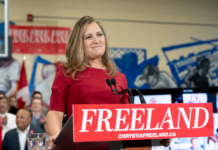The Bank of Canada has decided to leave its interest rate unchanged, remaining at 5%, according to a statement released by the central bank on Wednesday.
The statement went on to say that it was “prepared to increase the policy interest rate further if needed” while it “remains concerned about the persistence of underlying inflationary pressures.”
Core inflation metrics have shown “little recent downward momentum in underlying inflation,” according to the central bank’s statement.
The Bank of Canada has also warned that rising fuel costs will likely lead to inflation being “higher in the near term” before it will settle back down again.
In July, Canada’s annual inflation rate rose up to 3.3% from 2.8% in June.
The Bank of Canada’s announcement to hold the rate at 5% comes when the country’s economy is beginning to slow. Consumers aren’t relying on credit as much when it comes to their spending and the housing market has steadily slowed for some time now.
The policy rate set by the Bank of Canada dictates the cost of borrowing for Canadian lenders and instructs the rates consumers will have to pay on debt for things like mortgages.
Since March 2022, rate hikes have steadily gone up in an effort to curb spending and slow down inflation, a tactic used by many central banks to curb inflation.
Generally, it takes about a year to 18 months for the effects of interest rate hikes to be noticeable on the economy. There are also “lagged effects” from previous rate hikes which will continue to affect inflation down the road, noted the bank in their statement.
The Bank of Canada announcement marks the third pause on interest rates they have made this year, following two consecutive hikes of 0.25% in June and July.
The Bank of Canada also forecasted that inflation will go back down to 2% by sometime in 2025.
Metrics indicating strong wage growth, corporate pricing and inflation expectations will be used to monitor whether or not to raise or lower rates for their next decision.
Bank of Montreal’s chief economist Doug Porter, told his clients in a recent statement that while future hikes are a possibility, the Bank of Canada is “likely done with rate hikes.”
Porter said that inflation will probably rise back up to around 4% by the end of the year, but the slowing economy will help to lower inflation back down to 2% in time.
He also warned that it was too soon to be discussing interest rate cuts and that even talking about the rate pause could encourage consumers and markets to start spending in a way that jeopardizes the progress that the Bank of Canada has made thus far in keeping the economy stabilized.
“Policymakers clearly do not want a repeat of earlier this year, when a short-lived pause sparked thoughts of eventual rate cuts, in turn firing up housing,” wrote Porter.
The pause on interest rates means that Canadian homeowners won’t have to deal with even steeper mortgage rates, however those set to renew will have to face the spike in the cost of borrowing, which will mean higher monthly payments.
The likelihood that interest rates will return to the pre pandemic lows of 0.25% has an almost “zero chance,” according to mortgage broker Ron Butler of Butler Mortgage.
“That’s not happening,” said Butler, in a radio interview with Anthony Furey on AM640 Toronto, according to Global News.
Butler said it would take an “unbelievable catastrophe” like another Covid-19 pandemic before the Bank of Canada would return to such “ultra low” interest rates.
“The truth is the Bank of Canada has learned a lesson that … these incredibly low rates where interest is almost zero … They can’t do that anymore,” said Butler. “It’s too dangerous for house prices. It’s too impactful on the economy.”





















